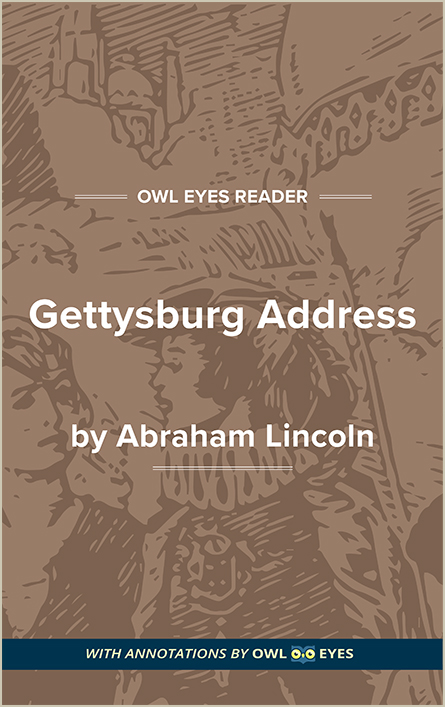- Annotated Full Text
- Literary Period: Reconstruction
- Publication Date: 1864
- Flesch-Kincaid Level: 11
- Approx. Reading Time: 1 minute
Gettysburg Address
On November 19, 1863, Abraham Lincoln rose to take his place before a gathering of 15,000. The place was Gettysburg, Pennsylvania. The occasion was the consecration of a new national cemetery. In a brief speech, Lincoln addressed the Civil War then engulfing the nation, a war whose bloodiest battle had been fought on the very ground on which the crowd stood. Just five months earlier, the Union had lain vulnerable before General Robert E. Lee’s 75,000 Confederate troops, who marched north toward Gettysburg. The Union responded with a force of 88,000, led by General George Meade. The two armies collided on July 1, 1863, and fought for three straight days until the Confederate forces retreated in defeat. With a full count of over 50,000 combined casualties, the Battle of Gettysburg marked the turning point in the Civil War and remains the most devastating clash in American history. In his commemorative speech, Lincoln sought to place the brutality of the Civil War before the backdrop of the American dream of democracy and freedom. His goal was to remind his fellow Americans what they were acquiring at the terrible cost of war: “a new nation, conceived in Liberty, and dedicated to the proposition that all men are created equal.” Lincoln’s Gettysburg Address has gained through the decades a towering reputation as an exemplar of public oratory. Today, the words of the address can be found chiseled into the marble of the Lincoln Memorial in Washington, D.C., close to the statue of Lincoln himself.
- Annotated Full Text
- Literary Period: Reconstruction
- Publication Date: 1864
- Flesch-Kincaid Level: 11
- Approx. Reading Time: 1 minute

